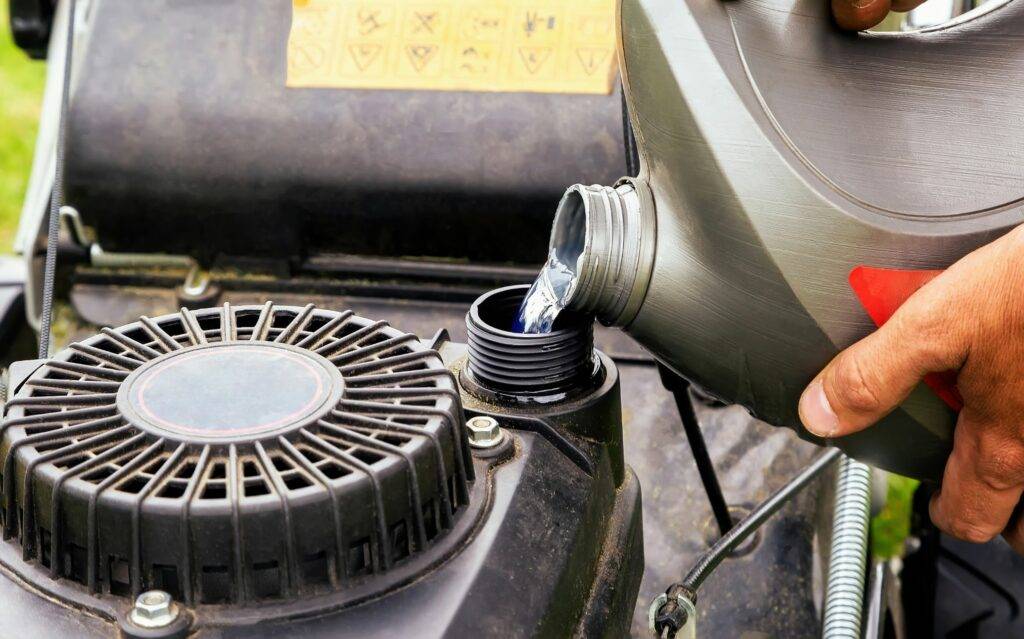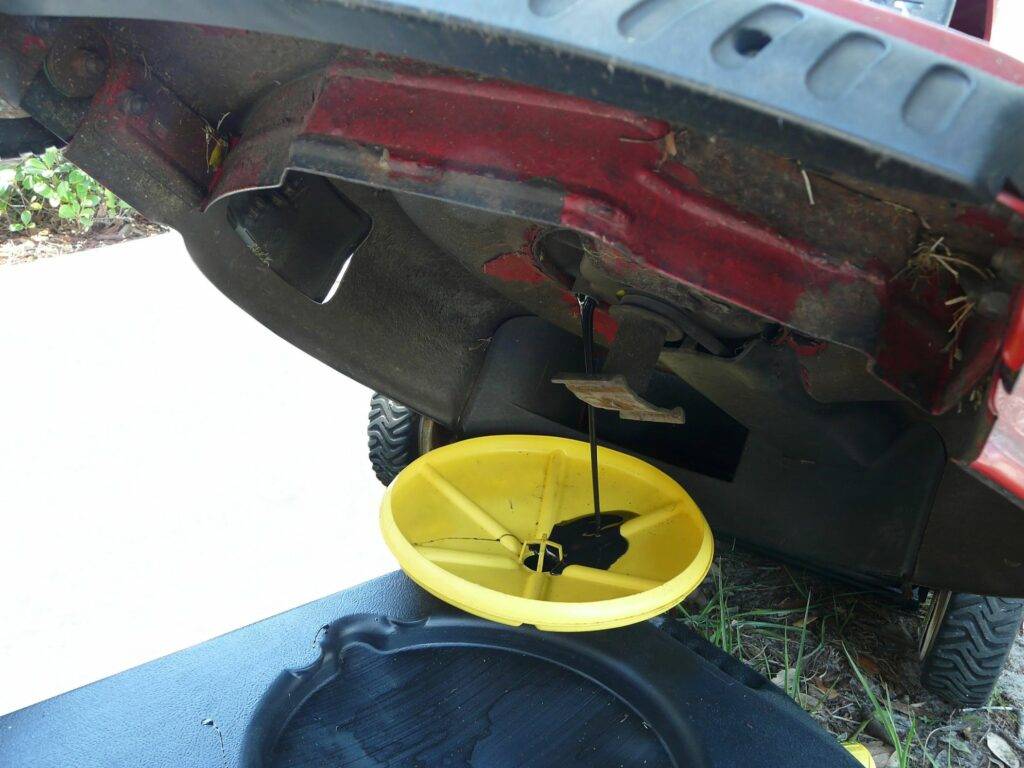When it comes to lawn mower maintenance, have you ever wondered if you can use car oil instead of specialized lawn mower oil? This unconventional idea might just be a game-changer in the world of lawn care. In this comprehensive guide, we’ll explore the feasibility of using car oil in lawn mowers, the benefits and drawbacks of using “car oil in lawn mower”, compatibility with different engines, and how to choose the right car oil for your lawn mower.
It is possible to use car oil in a lawn mower, as long as the right type and amount of oil is selected.
Compatibility with different engine types depends on the engine type, with two-stroke engines requiring specialized oil for optimal performance.
Regular maintenance tasks such as regular checks of oil levels, cleaning/replacing filters and using recommended oils are essential for preserving lawn mower performance and longevity.
Believe it or not, using car oil in a lawn mower is not only possible, but it can also offer some advantages. Standard engine oil designed for cars and trucks is a viable option for all four-stroke engines, as long as it’s changed regularly to maintain optimal performance. However, it’s crucial to select the right type of car oil for your mower’s engine, considering factors such as engine size and viscosity of high-quality synthetic oil.
Synthetic car engine oil is a popular choice for lawn mowers due to its lubricating capabilities, which contribute to better performance and longevity. For instance, 5W30 motor oil is suitable for lawn mowers. Synthetic oil is recommended for lawn mowers, but make sure to fill the oil tank with the appropriate amount of oil for smooth operation.
There are several benefits to using car oil in lawn mowers. For one, it’s thicker than standard mower oil, providing more protection against wear and tear. It’s also less likely to escape from the engine, reducing the chances of oil leaks. However, using car oil in lawn mowers may have some drawbacks, such as potentially decreased fuel efficiency and premature wear of the mower’s engine.
Different types of car oil can be used in lawn mowers, including synthetic oils, conventional oil, and synthetic blends. When selecting car oil for your lawn mower, it’s important to assess engine specifications to ensure compatibility, consider climate conditions, and adhere to manufacturer recommendations.
By following these guidelines and performing regular maintenance tasks, such as frequent oil assessments, cleaning and replacing filters, and overseeing engine care and performance, you can ensure the longevity and optimal performance of your lawn mower.
Lawn mowers typically have two types of lawn mower engine: two-stroke and four-stroke. Two-stroke engines are more cost-effective to manufacture, but emit greater levels of pollutants, while four-stroke engines are more expensive to produce and emit fewer pollutants.
When it comes to using car oil in lawn mowers, compatibility largely depends on the type of engine. Car oil is generally suitable for four-stroke engines, but it’s not recommended for two-stroke lawn mower engines, as they require specialized oil for optimal performance.
For instance, air-cooled engines in two-stroke mowers may require specific two-stroke oil designed for these engines. Using car oil in a two-stroke engine can lead to inadequate lubrication and decreased efficiency. It’s always best to consult the owner’s manual for your lawn mower to determine the appropriate oil for your specific engine type.

There are three main types of car oil that can be used in lawn mowers: conventional oil, synthetic oil, and synthetic blends. Each type offers different benefits and drawbacks, depending on the mower’s engine and the specific conditions in which the mower will be used.
In the following sections, we’ll discuss each of these types in detail and provide guidance on which one might be best for your lawn mower.
Conventional oil is more economical than synthetic oil and provides adequate performance under low temperatures. It also offers effective lubrication and helps to minimize engine wear.
However, conventional oil may not offer the same level of engine protection as synthetic oil and is more susceptible to oxidation-induced degradation. If you have an older engine model, conventional oil may be a suitable choice for your lawn mower.
Synthetic oil is a laboratory-developed product composed of petrochemicals that have a similar composition to crude oil. It is suitable for use in lawn mowers, provided it meets the engine’s specifications. Synthetic car oil is more expensive than conventional oil, but it offers superior results with regards to engine performance and durability. To ensure the correct type of synthetic oil is used, it’s important to review the label for any special additives that could cause damage to the engine in the long run.
In addition to its performance benefits, synthetic oil also offers advantages in terms of environmental impact. Synthetic SAE 5W-30 oil, for example, offers superior protection in all temperatures, enhanced starting capabilities, and reduced oil consumption. This means that using synthetic oil in your lawn mower can help reduce emissions and contribute to a cleaner environment.

Synthetic blends are a combination of conventional and synthetic oils that provide a balance of performance and cost-effectiveness. They are resistant to thermal degradation, making them suitable for high-demand machines such as lawn mowers. While they may not offer the same level of performance as fully synthetic oils, synthetic blends can still provide many of the benefits of synthetic oil at a more affordable price point.
If you’re looking for a cost-effective option that still offers some of the advantages of synthetic oil, synthetic blends might be the right choice for your lawn mower.

Selecting the appropriate car oil for your lawn mower involves considering factors such as engine type, climate, and manufacturer recommendations. In the following sections, we’ll delve deeper into these factors and provide guidance on how to choose the right car oil for your specific lawn mower.
When selecting car oil for your lawn mower, it is important to consider the type of engine.
As mentioned earlier, the type of engine in your lawn mower will dictate the type of car oil you should utilize. Four-stroke engines are suitable for use with car oil, with SAE 30 or 10W-30 being recommended types of oil for these engines.
On the other hand, two-stroke engines require specialized natural or synthetic mower oil for optimal performance. Always consult your lawn mower’s owner’s manual to ensure the correct type of oil is used.
When selecting car oil for your lawn mower, it’s important to consider the climate in which you will be using the mower. Temperature and humidity can influence the viscosity of the oil, resulting in a thicker or thinner consistency. For example, SAE 30 oil is the most common oil for small engines in warmer climates.
Be sure to choose a high quality oil that is suitable for the temperature and humidity conditions in your area to ensure optimal performance and engine protection.
Lastly, it’s crucial to follow the lawn mower owner’s manual for specific oil recommendations, including the use of lawnmower oil. Manufacturers have tested and determined the best type of oil for their engines, so adhering to their recommendations will help ensure optimal performance and prevent potential damage to the engine.
If you’re unsure about which oil to use, consult the manufacturer or dealer for guidance on the appropriate oil for your lawn mower model.

Once you’ve selected the appropriate car oil for your lawn mower, it’s time to change lawn mower oil. This process consists of preparing for the oil change, draining the old oil, and adding the new car oil.
In the following sections, we’ll outline the necessary precautions and steps for each of these tasks.
Before you begin changing your lawn mower oil with car oil, gather the necessary tools and materials, such as a catch pan, ratchet and socket set, and a funnel. Make sure your lawn mower is parked on a flat, level surface with the engine turned off and cooled down.
It’s also a good idea to remove the spark plug and spark plug lead to prevent accidental starting of the engine during the oil change process.
To facilitate the draining process, run the engine for a few minutes to warm the oil, making it less viscous without becoming too hot. Once the engine is warm, carefully loosen the oil drain plug and allow the old oil to drain into a container, such as a catch pan. Be sure to dispose of the old oil properly, as it can be harmful to the environment if not disposed of correctly.
If your lawn mower doesn’t have a drain plug, you can tilt the mower onto its side to allow the oil to run out through the dipstick tube. You can change the oil in your mower’s engine using an oil extractor kit. This is an alternative to pouring out old oil. Regardless of the method you choose, be sure to follow the manufacturer’s instructions and take necessary precautions to prevent spills and accidents.
After you’ve drained the old oil from your lawn mower, it’s time to add the new car oil. Using a funnel to prevent spills, carefully pour the appropriate amount of car oil into the mower’s oil reservoir. Be sure not to exceed the “full” mark, as overfilling can lead to overheating.
Once you’ve added the new car oil, replace the oil filler cap and reattach the spark plug and spark plug lead. Your lawn mower is now ready to run with its freshly changed car oil.

Regular maintenance is crucial for ensuring the longevity and optimal performance of your lawn mower, especially when using car oil. In addition to changing the oil regularly, some key maintenance tasks include checking the oil level, cleaning and replacing filters, and monitoring engine performance.
In the following sections, we’ll provide more detailed tips and advice on these important maintenance tasks.
Checking the oil level in your lawn mower regularly is essential for ensuring optimal functioning and preventing damage to the engine. To check the oil level, simply remove the dipstick from the oil reservoir, wipe it clean, reinsert it, and then remove it again to see the oil level.
If the oil level is low, add more car oil as needed, being careful not to overfill the reservoir. By maintaining the proper oil level, you can help ensure your lawn mower runs smoothly and efficiently for years to come.
Cleaning and replacing filters is another important maintenance task for lawn mowers using car oil. Dirty or clogged filters can reduce the efficiency of your lawn mower and cause unnecessary wear on the engine. Consult your owner’s manual for guidance on how often to clean or replace the filters in your specific lawn mower model.
By keeping the filters clean and in good condition, you’ll help maintain the mower’s performance and extend the life of the engine.
Maintaining optimal engine performance is important for the overall health and efficiency of your lawn mower, especially when using car oil. Regularly inspect your mower’s engine for signs of wear or damage, and address any issues promptly to prevent further problems.
In addition, using the appropriate car oil for your mower’s engine type, climate, and manufacturer recommendations will help ensure optimal performance and longevity. By taking proper care of your lawn mower’s engine, you can enjoy years of reliable performance and a well-manicured lawn.
Using car oil in your lawn mower is not only possible, but it can also offer several advantages over traditional lawn mower oil. By carefully considering factors such as engine type, climate, and manufacturer recommendations, you can select the right car oil for your mower and ensure optimal performance and longevity. Regular maintenance, including oil checks, filter replacements, and engine care, is essential for keeping your lawn mower running smoothly and efficiently for years to come. With the right car oil and proper maintenance, your lawn mower will be well-equipped to handle even the toughest landscaping challenges.
Using low-quality engine oil for your lawn mower can quickly shorten its life, so make sure you are using high-quality motor oil when servicing the smaller and less hardy engine.
This is especially important for lawn mowers, as their engines are not as robust as those in cars and other larger vehicles. Regular maintenance and the use of quality oil can help extend the life of your lawn mower and keep it running smoothly.
For a lawn mower engine, it is recommended that SAE 30 motor oil be used. While automotive engine oils such as 10W-30 or 10W-40 can be used in some instances.
Check your owner’s manual to make sure you’re using the right oil for your specific lawn mower model.
Yes, you can use 5W30 car oil in your lawn mower. Synthetic 5W30 is the preferred oil for lawn mowers, offering protection regardless of the temperature and being gentler on the metal parts.
For equipment operated in hot temperatures, Vanguard 15W50 Synthetic oil provides the best protection.
Car oil provides better protection against wear and tear for lawn mowers, as it is thicker than standard mower oil and less likely to escape from the engine.
This makes it a better choice for lawn mowers, as it will provide better protection and last longer.
When choosing the right car oil for your lawn mower, take into account engine type, climate, and manufacturer recommendations to make sure you select the best option.
Research the type of engine your lawn mower has, as well as the climate you live in. Different engine types and climates require different types of oil. Additionally, check the manufacturer’s recommendations for the best oil for your lawn mower.

© 2023 Lawn Care of Pittsburgh